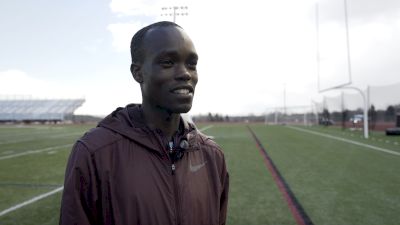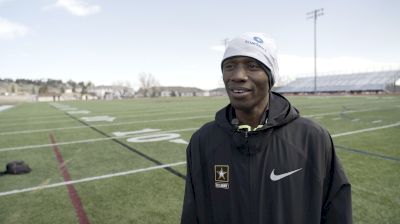Five Burning Questions For The 2019 World Cross Country Championships
Five Burning Questions For The 2019 World Cross Country Championships
We breakdown the five most pressing questions ahead of the 2019 IAAF World Cross Country Championships in Aarhus, Denmark.

Unlock this article, live events, and more with a subscription!
Already a subscriber? Log In
The 43rd edition of the IAAF World Cross Country Championships is this Saturday, March 30, in Aarhus, Denmark. A hilly and eclectic 10,000m course awaits the senior men and women, and below I’ve tried my best to answer five of the most pressing questions entering this weekend’s championship races.
Will Geoffrey Kamworor win his third straight World XC crown?
When Kenyan Geoffrey Kamworor is on his game in cross country or on the roads, there’s almost no one-- save Eliud Kipchoge in the marathon, of course-- who can beat him. Kamworor has won the last two World XC races in definitive fashion, averaging a 10-second margin of victory over some of the best cross country runners in the world. He’s also claimed three consecutive World Half titles, with his latest in 2018 featuring a preposterous 13:01 5k split between 15k and 20k to highlight the extent of his talent.
Kamworor enters Aarhus as the clear favorite, but as has been the case in the last two editions of these championships, the 26-year-old will have to topple men who beat him at the Kenyan National Championships and athletes with superior track pedigree to three-peat in Denmark. Kamworor was only fifth at the Feb. 23 Kenyan Trials in Eldoret-- 13 seconds back of race winner Amos Kirui-- but lest you think that is a sign of a great losing his fastball, know that he was also defeated at nationals in 2015 and 2017 before crushing everyone when it mattered most. It would also be foolish to extrapolate the results from a race run at 7,000 feet to one that will be contested at sea-level, so I’m mostly ignoring the fact that Kamworor was beaten soundly in Kenya. He has more experience than any of his countrymen, and that counts more in my book than recent history.
Of course, there are threats outside of just his own team. Uganda’s Joshua Cheptegei will be out for redemption after his disastrous World XC performance at home in 2017. Cheptegei infamously made a huge move a little past halfway to drop the field in Kampala, only to pay for it dearly as he succumbed to exhaustion and finished 30th. But make no mistake, the 22-year-old 10,000m World Championship silver medalist is a threat in Denmark, as is his 18-year-old countryman Jacob Kiplimo. Kiplimo won the junior race two years ago, and he beat Cheptegei at the Ugandan champs this year as well.
One other name worth mentioning is 12:43 5k man Selemon Barega of Ethiopia. The 19-year-old likely won’t be able to maximize his speed on the hilly and damp Aarhus terrain, but I can’t count out an athlete with so much talent. If Barega is still around in the last mile, he could be dangerous.
What are the U.S. men’s medal chances?
Last week I noted the series of factors that could help the U.S. men land on the podium for only the third time since 1987, but it bears repeating: the American Distance Project athletes-- five of whom will represent Team USA-- seem fitter than ever, they have a unique familiarity with each other as training partners, and the wet and technical Aarhus course could stifle the speed of Kenya and Ethiopia while benefiting the Colorado Springs-based group.

On paper, the Americans have assembled arguably their strongest team one through five (four score) since their glory days in the 1980s. Shadrack Kipchirchir (27:07 10k PB) and Leonard Korir (27:20 10k PB) have both progressed on the track since finishing 21st and 20th at the 2017 World Cross Country Championships, respectively, and so too has Stanley Kebenei (26th in 2017), who took fifth in the 2017 World Championship 3,000m steeplechase. And the Bor brothers, Emmanuel and Hillary, should be able to hang with their more experienced teammates after running 13:10 and 13:14, respectively, for 5k on Feb. 24.
This team is a medal threat on those merits alone, but the ADP athletes and their coach Scott Simmons believe that the difficult course could give them an added boost. The surface may not resemble the 2013 mud-fest in Poland as they were hoping, but the Aarhus terrain isn’t likely to be fast either; any moisture on the course could mean a muddy mess by the time the senior men run the fifth and final race of the event. That should help slow down shorter distance specialists like Ethiopia’s Barega and Kenya’s Kirui, and benefit an American team who trains year-round in the mountains.
That said, it’s going to be incredibly difficult to beat either of Ethiopia or Kenya. The two nations were both 50 points better than third place Uganda two years ago, and beating one of them this weekend would almost certainly require four top 10 finishes; I can’t even squint and see that happening. But bronze is absolutely there for the taking. The U.S. was just six points back of third place Uganda in 2017, and that was in Uganda with a less-prepared American squad. I’ll take Team USA for third in Aarhus.
Who is the men’s team favorite-- Kenya or Ethiopia?
Since 1981, Kenya or Ethiopia has won the men’s title at Worlds, and unless both of Geoffrey Kamworor and Selemon Barega tumble off the museum roof in Aarhus, that won’t change this year.
Ethiopia has won the last three men's titles, but I don’t see them making it four in Denmark. Just one of their five men who placed top 10 two years ago is back (Bonsa Dida), and aside from Dida and the track star Barega, this year’s Ethiopian squad seemingly lacks the necessary oomph to take on Kamworor and co.
Barega is the name brand athlete for the Ethiopians, but it’s not yet clear how well his track skills translate to world-class cross country. When he faced Kenyan road racing stud Rhonex Kipruto in January in Spain, he was beaten handily by 22 seconds. Kipruto, in turn, was just sixth at the Kenyan Championships. Dida placed top 15 at World XC in both 2015 and 2017, but his results in the last two years haven’t been inspiring. Another Ethiopian, Andamiak Belihu, was 10th in the World Championship 10,000m in 2017, so perhaps he can emerge as a surprise contender in Denmark.
But regardless, Kenya is the team to beat. Kamworor is so experienced and accomplished from the track to the marathon that it would be a shock if he didn’t finish top three. The trio of Amos Kirui, Richard Yator and Kipruto can’t hold a flame to Kamworor’s resume, but they’ve all shown flashes of stardom. Kirui is the Kenyan Cross Country champion and he won the steeplechase World junior title in 2016. Yator finished third in the junior race in Uganda in 2017 and has a 12:59 PB to his credit. And then there’s the 19-year-old Kipruto, the 2018 world junior champion in the 10,000m who last year came within two seconds of matching the road 10k world record with his 26:46 in Prague. Kipruto closed that race with a 13:15 5k.
Both teams are once again formidable, but Kenya to me has an obvious edge.
Can anyone keep the Kenyan women from more dominance?
The Kenyan women displayed an unprecedented level of dominance in 2017. Not only did they drop the first ever perfect score (10 points) in the senior race, but they swept the top six places, a feat that may not be matched for a long time, if ever. For their encore, the Kenyans will have almost an entirely new roster-- just one member of the 2017 team returns-- but don’t expect them to have a letdown even if they can’t hope to match their epic sweep this time.
This may be a new group, but the Kenyans shouldn’t be worried about the turnover of their team at all. 2017 World 5,000m champion Hellen Obiri will make her World XC debut, and she has a strong chance to claim gold in Aarhus after winning the Kenyan Championships by 10 seconds. Beatrice Chepkoech is also new to the stage, but her steeplechase world record suggests she’ll do just fine. Add in the 2017 bronze medalist in Kampala, Lilian Rengeruk, and the Kenyans have the strongest top three of any team.
Team Ethiopia doesn’t have near the star power of athletes like Obiri and Chepkoech, but they do have two young up-and-comers that give them a shot to challenge Kenya. Letesenbet Gidey won back-to-back world junior cross country titles in 2015 and 2017, and her teammate Hawi Feysa finished second behind her in Uganda. These two will have to be on to upset a team in Kenya who has won five of the last six women’s races, but an unpredictable course in Aarhus could thwart some of the speed that the Ethiopians need to combat in order to win.
What are the U.S. women’s medal chances?
The American women have a more difficult path to a medal then their male counterparts.
Kenya and Ethiopia are similarly formidable in the women’s race as they are in the men’s, but the difference is the presence of the Bahraini women, who return three of their scorers from the bronze medal team in 2017. The Americans, who have just one runner with World Cross experience, will in all likelihood have to beat one of the top three African teams to secure a medal for the first time since 2011.
A certain glimmer was lost from this team when U.S. Cross Country champion Shelby Houlihan declined her spot to Aarhus, but it will still be fascinating to see how the Bowerman trio of Marielle Hall, Courtney Frerichs and Karissa Schweizer fare in each of their first appearances at World XC.
Hall beat her two teammates soundly in flat and fast Tallahassee, but the tough course could work in the favor of Frerichs, the steeplechase American record holder, and Schweizer, a former NCAA Cross Country champ. NAZ Elite’s Steph Bruce, the only American who raced in Uganda, could also ride her marathon strength and experience to top U.S. honors on Saturday.